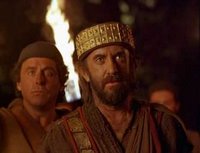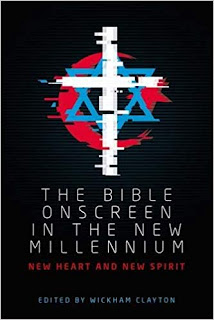David (1997)
 Amongst the many heroes and men of good repute in the Hebrew Bible, two stand head and shoulders above the others – Moses and David. The phenomenal success of The Ten Commandments (1956) has given Moses the edge amongst biblical epics. Nevertheless, David has also been a popular figure, from 1909’s Saul and David, through to Bruce Beresford’s King David (1985), the last Bible film to be made by a major Hollywood studio. Over the years films about David have had their pick of good actors, with Gregory Peck and Richard Gere both taking the role of Israel’s finest monarch.
Amongst the many heroes and men of good repute in the Hebrew Bible, two stand head and shoulders above the others – Moses and David. The phenomenal success of The Ten Commandments (1956) has given Moses the edge amongst biblical epics. Nevertheless, David has also been a popular figure, from 1909’s Saul and David, through to Bruce Beresford’s King David (1985), the last Bible film to be made by a major Hollywood studio. Over the years films about David have had their pick of good actors, with Gregory Peck and Richard Gere both taking the role of Israel’s finest monarch.The Bible Collection has produced their own versions of both men’s lives. This time around though, the big names in David are the co-stars, Leonard Nimoy (Samuel) and Jonathan Pryce (Saul). Nimoy is destined to be always remembered as Mr. Spock, and his career has struggled to recover from the extraordinary popularity of one of the TV/cinema’s best known roles. On the other hand, Pryce will be remembered for different films by different people. For some it will be Terry Gilliam’s futuristic nightmare Brazil; For others as James Bond’s enemy in Tomorrow Never Dies; Still others will remember him from Evita, Carrington, Pirates of the Caribbean or, in my case, Selling Hitler.
 David himself is played by Nathaniel Parker, who at the time was relatively unknown, but has subsequently gone on to play the lead in The Inspector Lynley Mysteries and Skimpole in the recent BBC version of Bleak House. Strangley however, it’s the lesser known Parker whose other work ends up being the most distracting. The chameleonic Pryce easily adapts to any role he is given, and even Nimoy manages not to evoke too many memories of Mr. Spock. But anyone watching David after Bleak House will find that thanks to Parker’s distinctive features Skimpole is never be far away.
David himself is played by Nathaniel Parker, who at the time was relatively unknown, but has subsequently gone on to play the lead in The Inspector Lynley Mysteries and Skimpole in the recent BBC version of Bleak House. Strangley however, it’s the lesser known Parker whose other work ends up being the most distracting. The chameleonic Pryce easily adapts to any role he is given, and even Nimoy manages not to evoke too many memories of Mr. Spock. But anyone watching David after Bleak House will find that thanks to Parker’s distinctive features Skimpole is never be far away.Parker’s performance as David certainly isn’t bad, but for the first half of the film he is acted off the park by Pryce, who excels in every scene he features in. He gives Saul a desperate intensity, soaring with confidence one minute only to be wracked with fear the next.
 As with most of the Bible Collection series, the story is split into two ninety-minute episodes. Unusually part 1 commences with the death of Saul, before returning to his calling years earlier, and progressing through to the film’s starting point towards the end of part 1. The stories of David accession to king, and the stories of the early years of his rule are quickly summarised and the story breaks shortly after, partway through the incident with Bathsheba.
As with most of the Bible Collection series, the story is split into two ninety-minute episodes. Unusually part 1 commences with the death of Saul, before returning to his calling years earlier, and progressing through to the film’s starting point towards the end of part 1. The stories of David accession to king, and the stories of the early years of his rule are quickly summarised and the story breaks shortly after, partway through the incident with Bathsheba. The second half opens with David dispatching Uriah and works through the various stories surrounding the subsequent collapse of David’s family. These are the lesser-known, and less dramatic stories from David’s life. As a series, The Bible Collection has sought to bring these more obscure stories back into the limelight, and generally it has worked creditably well. Sadly, here it works less well. Whilst the first half of the film feels like an epic narrative, the second half devolves into something like a family soap opera. The difference between the natural drama of halves 1 and 2 is further emphasised by the deaths of Samuel and Saul shortly before the end of part 1, thus robbing us of the film’s two best and most charismatic actors. When Saul falls on his sword, his absence is felt keenly. New actors come in to play the later roles of Bathsheba, Amnon and Absalom, but their acting is too weak to carry the remainder of the film.
 That’s not to say there is nothing to enjoy. David Beatty and Paul Rubell’s editing enhances the drama in several places. The flashback device of the first half gives it a stronger narrative ark, and heightens the tragedy of Saul’s demise. In the second half, one sequence in particular stands out. Scenes of David fleeing across the Jordan, are intercut with those of his son Absalom foolishly frolicking with his concubines. Meanwhile, Absalom’s dejected and ignored advisor Ahithophel hangs himself. The sequence forms the climax of part 2, made all the more impressive by the way Ahithophel’s death deftly pre-figures his master unusual demise shortly after.
That’s not to say there is nothing to enjoy. David Beatty and Paul Rubell’s editing enhances the drama in several places. The flashback device of the first half gives it a stronger narrative ark, and heightens the tragedy of Saul’s demise. In the second half, one sequence in particular stands out. Scenes of David fleeing across the Jordan, are intercut with those of his son Absalom foolishly frolicking with his concubines. Meanwhile, Absalom’s dejected and ignored advisor Ahithophel hangs himself. The sequence forms the climax of part 2, made all the more impressive by the way Ahithophel’s death deftly pre-figures his master unusual demise shortly after.Taken in isolation the story of David is ultimately a tragedy. Jonathan, Saul, Uriah, Amnon, Ahithophel and Absalom all die prematurely because of David and Saul’s moments of weakness. The filmmakers have chosen the episodes from David’s life most suitable for emphasising the tragic thread throughout the story. As the film progresses, the Psalms David utters grow darker and darker. Whilst the final scene attempts to provide an upbeat ending, it cannot mask the frank and honest appraisal of Saul and David’s lives that the film gives over all. David may have ended up one of the biggest heroes in the bible, but this film reminds us that even those God has chosen can inflict much unnecessary pain.
Labels: Bible Collection (The), David, Solomon













2 Comments:
At 4:23 pm, December 07, 2006, Anonymous said…
Anonymous said…
This review makes me want to see the film. Too often the tragic nature of the David story is lost in our retelling. I am very impressed with this review. Thanks Andrew McThenia
At 11:10 pm, March 02, 2016, Unknown said…
Unknown said…
I myself loved the movie. The first time I saw the movie I myself fell in love with the movie and I thought that Natheial Parker played very well. All played very well. No matter how God's words are played out it still means the same.
Post a Comment
<< Home